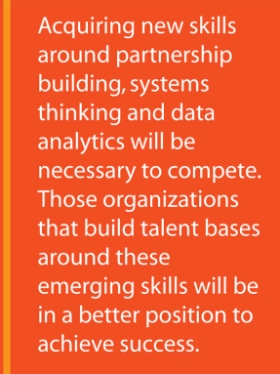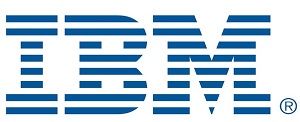Transformation of the healthcare industry is finally happening, and with dramatic energy, driven by a fundamental shift in the expectations of all stakeholders: patients, governments, payers,employers and providers. Today the market is rejecting the three major structural deficiencies that have resulted in the industry’s systemic challenges:
1.) an over-emphasis on expensive advances in medical technology that yield incremental improvements in outcomes with inadequate consideration to cost;
2.) the myopic focus on capacity for acute care to the detriment of wellness, prevention and population health strategies;and
3.) the use of volume-based reimbursement models.
Most healthcare organizations realize their business models are aligned with one or all of these tenets of a legacy system. They recognize they must reconsider the consequences of their value proposition and its impact on the health and economic vitality of their institution and the individuals, communities and nations they serve. The leaders in the industry are already aggressively pushing innovation into the core of their business and service models, not to achieve incremental change, but to change fundamentally their way of thinking about the service they deliver.
To do this, healthcare institutions are developing the competencies to redefine value to their stakeholders. They are thoughtfully assuming and managing risk and focusing on wellness and outcomes in order to remain viable. And as value becomes understood as a measure of health and well-being,organizations that respond are establishing the characteristics for a more coordinated, efficient and purposeful healthcare system to emerge.

Redefining Value Requires New Competencies
Though mandatory, the transformation to smarter healthcare is no small undertaking. No longer is the industry making incremental changes. There is dramatic energy to change, of a magnitude never seen before. It is forcing organizations to reconsider their business models, reorient their operations around the patient and re-imagine the future of healthcare. It is also forcing them to develop powerful, new competencies that will allow them to meet the new demands of the market. They will need to collaborate with unfamiliar business partners,attract and retain a different mix of talent, adopt new technologies and, in some cases, abandon traditional sources of revenue.
For healthcare organizations to survive and thrive in this period of transformation, they will need to make hard, thoughtful and informed decisions about every aspect of their operations and their business. Many healthcare organizations have already begun to develop new competencies to support strategic decision making, while also building the organizational agility that will be necessary to adapt to changing market conditions. In working with hundreds of clients across the global healthcare ecosystem, IBM® has identified several essential competencies that are preparing healthcare organizations for the future:
• Collaboration and partnering
• Information proficiency
• Personalization of health
• Talent creation and retention
• Technology enablement
Collaboration and Partnering
Building the tools and skills for collaborating and partnering is essential for working with patients, payers, providers and other stakeholders across the healthcare ecosystem. How organizations engage with others is critical: sharing ideas and information, engaging relationships with a ‘win-win’ mentality and a willingness to reconsider, redefine and reinvent their role. These skills are the basis of coordinated care delivery. But they also help extend one’s brand into new geographies,anwith a flexible business model, allows one to innovate, adapt and collaborate. Many institutions will need to draw upon their heritage to assess and leverage their core values into new partnerships, new ventures and endeavors. Creating more patient-centric, coordinated and accountable care means all service providers must share risks and data, and they must conduct business with partners that cross traditional boundaries.
Information Proficiency
Coordination of processes, use of standard practices and collaboration among stakeholders can only be achieved if you can measure, monitor and analyze performance data and gain actionable clinical and business insight. Organizational innovators are already implementing smarter decision making by using health analytics to publish metrics at point of care, measuring performance and changing behavior to become more “intelligent”. To improve care, healthcare stakeholders will need to coordinate, track and manage performance using new metrics: the health outcomes for the patient measured over a lifetime, and the value of the interventions across the care continuum. To do this requires volumes of reliable health and operational data. It also requires organizations to become exceedingly proficient in information management. How organizations capture, store, use and share information is a critical competency to enable the organization’s strategy. The ability to access the wealth of information across the enterprise is no longer a luxury, but a necessity, required to correlate cost and quality information, and to apply insight back into business processes that can inform action and change behavior.
Personalization of Health
Empowering patients means developing multi-channel approaches, convenient locations and varied settings to expand access to healthcare services. It means delivering longitudinal and preventative care versus episodic and transactional care. It also means using innovative technologies and data to personalize treatments and engage citizens in their own health management and disease prevention. Regardless of the knowledge we may have of health, medicine and technology, if it doesn’t fit into the patient’s world, it will never be effective. Providers must understand the characteristics and needs of each individual beyond the condition and medical status to really understand the patient’s care needs and barriers, their service preferences,financial circumstances, habits and level of engagement. To empower patients is not simply making healthcare more accessible and patient-centric. It is to create extreme personalization: to understand the critical characteristics that inform the patient’s choices, actions and responses to their own health requirements in order to reach, serve and influence their participation in their own health management.
Talent Creation and Retention
 In an increasingly competitive and resource-constrained industry,establishing programs for talent creation and retention to enable proactive hiring, new skills development and incentives for employees is a strategic necessity. Healthcare organizations must be able to acquire the talent that will enable the enterprise to move into new business models it may design and desire. It also means assessing the culture and value set of the organization to understand and leverage its heritage and values into these new models. How will the organization recognize, communicate and reinforce the attitudes and actions that support the realization of new commitments?Resource managers are finding that talent proficiency no longer can be measured across just one dimension, whether that is people,process or technology.
In an increasingly competitive and resource-constrained industry,establishing programs for talent creation and retention to enable proactive hiring, new skills development and incentives for employees is a strategic necessity. Healthcare organizations must be able to acquire the talent that will enable the enterprise to move into new business models it may design and desire. It also means assessing the culture and value set of the organization to understand and leverage its heritage and values into these new models. How will the organization recognize, communicate and reinforce the attitudes and actions that support the realization of new commitments?Resource managers are finding that talent proficiency no longer can be measured across just one dimension, whether that is people,process or technology.
Real value comes from individuals whose skills can be deployed across different boundaries of the business. Creating agility includes not only the acquisition of valuable talent but also continuous learning, skills expansion and the grooming of future managers and leaders. It embraces recruiting and values primary care providers cross the system. Acquiring new skills around partnership building,systems thinking and data analytics will be necessary to compete. Those organizations that build talent bases around these emerging skills will be in a better position to achieve success.
Technology Enablement
Technology plays a critical role in enabling healthcare transformation. It improves operations, supports collaboration and lays the groundwork for data-driven decision making. The ability to capture, integrate and analyze data across different stakeholders,care settings and geography is essential, as is modernizing infrastructure to increase agility. New modalities, diagnostics and innovative medical devices, as well as the use of telemedicine and remote monitoring, add to technological enablement by increasing access and expertise. Technology eliminates current borders of the business by overcoming barriers such as distance, knowledge or practice. It is a key enabler to transformation, and the healthcare industry must now utilize information technology for advantage, as so many other industries have, to innovate their businesses and to eliminate disparities.
Throughout the industry, there are forward-thinking organizations that are developing these and other new competencies and using them to reduce costs, increase access and improve quality and outcomes. They are partnering with unfamiliar allies, focusing on customer service, and integrating information from across their ecosystems to inform decision making with data. These organizations are preparing for the uncertainty that comes with industry-wide transformation. They are positioning themselves for success, and they are defining the future of healthcare.
Conclusion
Ultimately, the goal is to improve health and well-being for individuals and society. The healthcare industry is now in an unprecedented period of change. For healthcare stakeholders to either stand still or perpetuate only incremental optimization to legacy paradigms will only accelerate an organization’s possible demise. The industry can expect a relentless pursuit to value that is being defined on an entirely new axis. In this age of transparency, realization of value will be recognized, and inability to deliver will be exposed.
As value becomes understood as a measure of health and well-being, organizations that respond to deliver outcomes will succeed. They will do so with a better understanding of clinical evidence and greater clarity to what is needed to improve health: for the specifics of the individual and for their communities, to ultimately promote a more coordinated,aligned and efficient healthcare delivery system of the future.This is a most exciting time for the healthcare industry and many organizations are embracing the opportunity. Change done well has the potential to truly reinvent care, outcomes and cost, providing a great foundation for the future.
IBM brings together two essential bodies of knowledge and resources to help your organization answer these questions and continue the transformation of the healthcare industry:
1.) deep expertise in managing and integrating complex systems that has helped transform the world’s retail, financial and energy industries; and
2.) broad expertise in life sciences, bioinformatics and the full spectrum of healthcare disciplines. With more than 8,000 employees dedicated to healthcare, including more than 60 medical doctors and 350 healthcare professionals, IBM has completed more than 3,000 successful healthcare transformation initiatives, ranging from small hospitals to national healthcare projects. IBM holds more than 600 patents in the life sciences, healthcare and medical device fields. It has been an active participant with governments working to lay the foundations of a 21st century healthcare system. Together with its healthcare clients and partners, IBM is redefining value and success in healthcare and is helping to build a smarter healthcare industry.



















